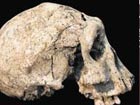| Videos | ? Latest |
|
? Feature | ? Sports | ? Your Videos |
New clue into human evolution found
An archaeological site located in southern Georgia has provided a key element in solving the mystery of human evolution. Let's dig into one of the oldest questions in history.
This archaeological site could hold the secret to human evolution.
Fossils at Dmanisi date back nearly two million years and represent the first prehistoric human fossils ever found outside of Africa.
David Lortkipanidze, director of Georgia’s National Museum, said, "We could say for sure that Dmanisi is the earliest site in the whole of Eurasia."
The primitive humans are believed to have been short with sturdy legs, well suited for long distance walking.
The debate is still ongoing among
paleo-anthropologists, whether the Dmanisi fossils represent Homo Erectus, or if they are a new species of early humans.
David Lortkipanidze said, "We could say that Dmanisi people are the best candidates to be the first ancestor of Homo Erectus. We could easily say that we are between Habilis and Erectus. Either we found first Homo Erectus or we found new species Homo Georgicus. This is the big question and answer we do not have yet. I do hope that the new finding will clarify this issue."
The Dmanisi archaeological site dates back to 1936.
The findings came at the same time stone ruins of a medieval city, situated along the Silk route, were unearthed.
In 1991 a jaw bone was discovered.
But it was in August 2005 that archaeologists unearthed their real treasure - a skull in good condition. Since then, excited archaeologists have been investigating its origins and age.
Jean Francois Milou, dmanisi architect, said, "It is very important site and a very fragile site at the same time, so the challenge is to protect the site and at the same time David Lortikipanidze wanted this site to be the part of the Georgian identity, as they say, and the education.
The discoveries have provided additional evidence that prehistoric humans left Africa a half-million years earlier than scientists had previously thought.

Comments
Add your comments...
- Your Name Required
- Your Comment
- Comments are moderated and generally will be posted if they are on-topic and not abusive.
 0 Comments
0 Comments






